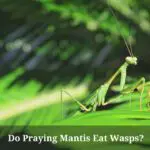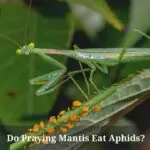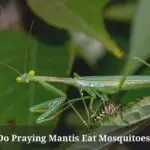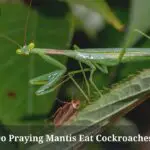If you keep a praying mantis as a pet, you may at some point find yourself considering feeding it on ants. But before actually taking that step, you will want to know whether eating ants is alright for a praying mantis. This article has the answer.
Do praying mantis eat ants? Yes, praying mantis do eat ants. Relying on their camouflage and fast reflexes, praying mantises are able to capture and eat live ants. It may thus be appropriate to feed a pet praying mantis on live ants.
To be sure, the ants are not usually a praying mantis’ favorite or first choice of food. Indeed, if you research on what do praying mantis eat, you normally won’t find ants at the top of the list.
At the top of that list are normally things like aphids, crickets, fruit flies as well as ladybugs.

But if a praying mantis that is looking for food happens to chance upon vulnerable ants, it may eat them. And if ants are all that is available for a praying mantis to eat, then it won’t hesitate from devouring them.
Yet those who are conversant with insects know that ants tend to be very hard to prey on. They can gang up against a predator. And they have mechanisms for warning each other whenever there are predators around.
Given those facts, there are people who have doubts as to whether praying mantis can really eat ants at all.
So it may be a good idea for us to start by establishing whether praying mantis really have what it takes to prey on ants.
Can Praying Mantis Eat Ants?
Yes, praying mantis can eat ants.
There are many reliable reports of people having seen praying mantises eating ants. It may even be possible to find videos of praying mantises eating ants.
On account of those reports, it is clear that praying mantis can eat ants.
Moreover, praying mantises have all that is necessary to be able to feed on ants.
Firstly, they have a camouflage advantage. They are able to blend in with their surroundings.
Relying on this camouflage, the praying mantis doesn’t have to go chasing after the ants. It is the ants that eventually bring themselves to the praying mantis.
Secondly, praying mantises have the fast reflexes necessary to grab and feed on live ants.
Therefore praying mantis can eat ants, on account of these factors.
How Do Praying Mantis Eat Ants?
Praying mantises eat ants live. They only eat live ants. They can’t eat ants which they find already dead.
Normally, a praying mantis that is seeking food will lie close to a place with ants. The ants are unable to recognize the praying mantis, as its camouflage enables it to blend in with the surroundings.
Therefore as the ants go about their affairs, some inevitably stray near the praying mantis. The praying mantis will wait till the ants are close to it. Then it will grab them, and eat them live.
What do praying mantis eat ants with? They use their mouthparts, whose formal name is mandibles, to eat the ants whole.
Why Do Praying Mantis Eat Ants?
Firstly, the praying mantis are carnivores. They mostly feed on insects. And ants are insects. So the praying mantis eat the ants on this account.
Secondly, the praying mantises eat ants because the ants are reasonably nutritious to them. Most ants may be too small to provide much satiety. But they nonetheless provide some nutritional value…
Thirdly, the praying mantises eat ants because the ants are quite easy for them to hunt down. Moreover, the ants tend to be plentiful. Thus a praying mantis that chances upon a place with a good ants population can eventually eat to its fill.
Given all those facts, one may ask, can you feed live ant lions to a pet praying mantis? And the answer is ‘yes’. Such ants may be a good occasional treat for your pet praying mantis.
Which Types Of Ants Do Praying Mantis Eat?
There are many types of ants out there. The number of ant species runs into tens of thousands: as many of 22,000. A question naturally arises, as to which of these types of ants praying mantises eat.
Does praying mantis eat ants indiscriminately and regardless of their species? Or do praying mantises only eat certain types of ants?
Now the best we can do, in answering that question, is look at three common types of ants: red ants, fire ants and carpenter ants. Then we seek to establish whether praying mantises can eat them all.
Do Praying Mantis Eat Red Ants?
Praying mantis are capable of eating red ants.
If praying mantises find red ants, they sometimes proceed to feed on them.
Of course, the red ants are quite adept at defending themselves. But if the predator they are up against is a praying mantis, they often stand little chance.
The good thing about red ants is that they are relatively big in size. Thus a praying mantis that gets to eat a handful of them may have a big enough meal.
Do Praying Mantis Eat Fire Ants?
Sometimes, praying mantises do eat fire ants.
Praying mantises definitely have what is necessary to eat fire ants: camouflage and quick reflexes.
Thus a praying mantis may lay in wait near a place with fire ants. The fire ants draw close to the praying mantis. And once they are close enough, the praying mantis grabs them, and eats them live.
Do Praying Mantis Eat Carpenter Ants?
Praying mantises do eat carpenter ants.
The carpenter ants may not be the praying mantis’ first food of choice. But if a hunting praying mantis chances upon the carpenter ants, and the opportunity to feed on them is good, then it will devour them.
Since the praying mantis eats the carpenter ants live, they may not have a chance to discharge pheromones to warn others of the predation.
Thus the praying mantis can just lie around there, and eat the carpenter ants to its fill.
Which Types Of Praying Mantis Eat Ants?
In a discussion on praying mantises eating ants, a question on which specific types of praying mantis eat ants is bound to come.
So, do all praying mantis eat ants? Or is it only certain types of praying mantis that eat ants?
To be more specific, do baby praying mantis eat ants? What about adult praying mantises: do they eat ants? Let’s find out.
Do Baby Praying Mantis Eat Ants?
Baby praying mantises normally don’t eat ants.
Hunting for ants requires a level of dexterity that baby praying mantises may not have.

What do praying mantis babies eat, instead of ants? Those include things like fruit flies, as well as aphis and midges.
Interestingly, they may also eat other baby praying mantises. That may get you worried, wondering, will my baby praying mantises eat each other? And the answer is ‘yes’ – that is always a possibility.
Thankfully though, the cannibalistic tendency in baby praying mantises is not as strong as in adults.
Now another name for baby mantises is nymphs. Thus what we have said is also what would apply in answering the do praying mantis nymphs eat ants question.
Do Young Praying Mantis Eat Ants?
So far, we have established that baby praying mantises normally don’t eat ants. But what about the somewhat bigger ones: those that are neither babies, nor adults? Do they eat ants?
Yes, praying mantises that are in between the nymph and adult stage may be able to eat ants.
Once a praying mantis develops the dexterity necessary to eat ants, there is nothing to stop it from doing so. That is provided it happens to find vulnerable ants it can prey on via camouflage.
Do Adult Praying Mantis Eat Ants?
Yes, adult praying mantis eat ants. It happens commonly enough.
For an adult praying mantis, ants may be quite easy to hunt for. All that the adult praying mantis has to do is lay in wait, near the ants’ location: relying on its camouflage.
In due course, the ants (which are unable to spot the camouflaged adult praying mantis) will come very close. Then all the praying mantis has to do is grab them, and feed on them live.
Can Ants Kill A Praying Mantis?
So far, we have been focusing our attention on praying mantis eating ants. But as we all know, the ants are also ferocious insects in their own rights. So we need to know whether, if roles are reversed, the ants can kill the praying mantis.
And the answer is ‘yes’, if ants happen to chance upon a vulnerable praying mantis and swarm it, they can quite easily tear it apart.
The only advantage that the praying mantis has over the ants is that it is able to camouflage. It therefore disguises itself from the ants.
However, an unlucky praying mantis that happens to be spotted by ants in a vulnerable situation can be torn.
There are many enough videos online and elsewhere of ants swarming praying mantises and tearing them apart…
While at it, someone may ask, do ants eat praying mantis eggs? And the answer is ‘yes’ – in fact, ants are among the major predators against praying mantis egg cases.
Final Verdict – Do Praying Mantis Eat Ants
Praying mantises do eat ants.
In all cases, a praying mantis feeds on live ants. Through its camouflaging ability, it disguises itself from the ants. So the ants draw close to it, at which point it simply grabs them and eats them live.
It is normally the adult praying mantises rather than the baby praying mantises that eat ants.

Ants are usually not the sort of insects that a praying mantis views as favorite meals. Since most ants are small, a praying mantis would have to hunt down quite a number, to get a proper meal. That can be quite a lot of work.
Thus a praying mantis will prefer other things like fruit-flies, aphids, crickets and ladybugs. But if a hunting praying mantis does find vulnerable ants to eat, it may also devour them.
And if you keep a pet praying mantis, you may consider feeding it on ants as a treat from time to time. That is supposing you can find suitable live ants for it.
As a pet lover, make sure to learn about pet more and give your pet mantis a good and comfortable life!

Welcome to Learn About Pet. My name is Rajkumar Ravichandran and I love all pets, travel, and amazing food. I write about my passion and personal experience caring for multiple pets in this blog! ❤️
Post Disclaimer
DISCLAIMER: THIS BLOG OR WEBSITE, "Learn About Pet", DOES NOT PROVIDE YOU WITH MEDICAL ADVICE AND IS NOT A SUBSTITUTE FOR MEDICAL ADVICE. ALWAYS GET IN TOUCH WITH YOUR PERSONAL VETERINARIAN AND USE INFORMATION HERE AS GENERAL ADVICE.
The information, including but not limited to, text, graphics, images and other material contained on this website are for informational purposes only. No material on this site is intended to be a substitute for professional veterinary advice, food recommendation, diagnosis, or treatment. Always seek the advice of your veterinarian or other qualified health care provider with any questions you may have regarding a medical condition or for pet food related questions.







